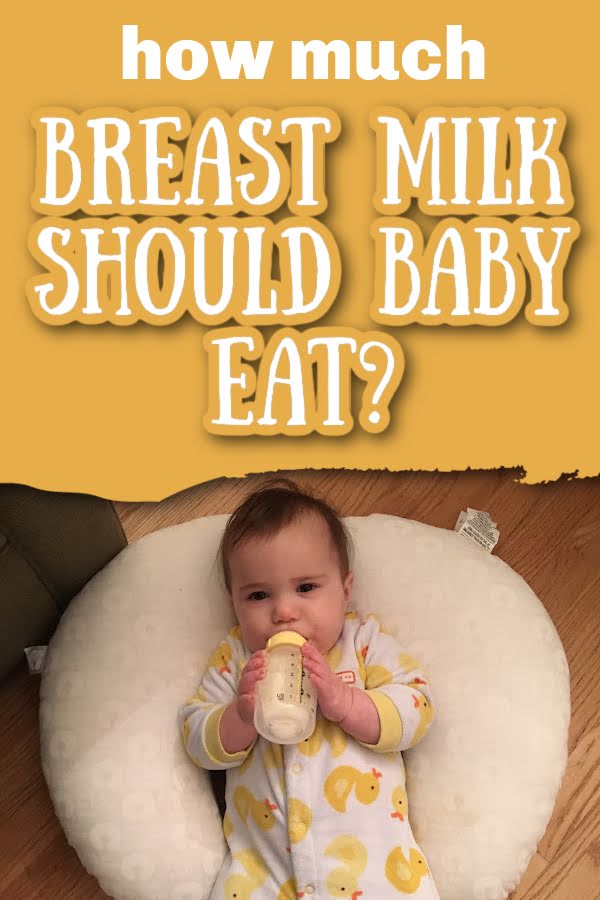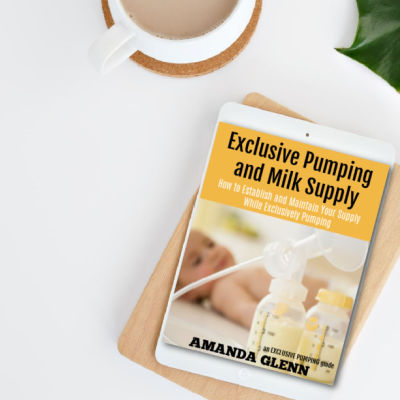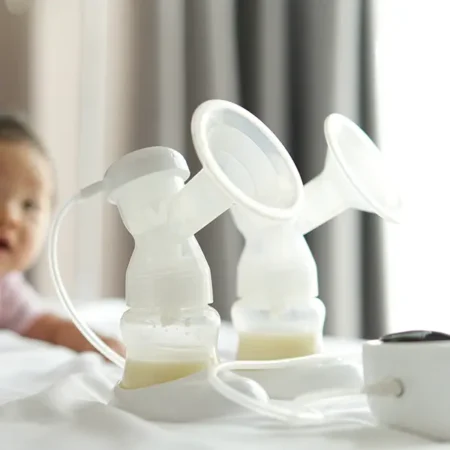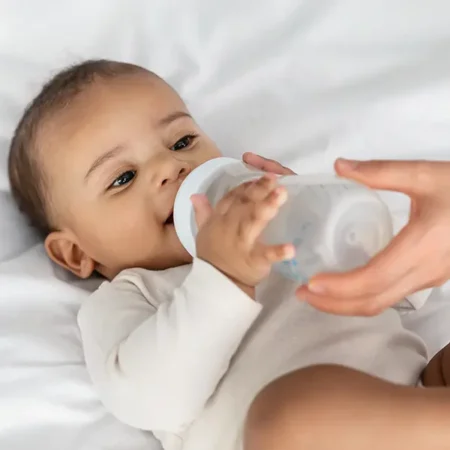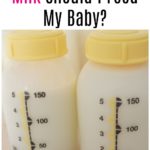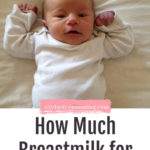When you’re exclusively pumping for your baby – or even if you’re just bottle feeding pumped milk occasionally – it can be hard to know exactly how much breast milk your baby should be eating. How much should your baby get per feeding? And how much should he or she eat in a day?
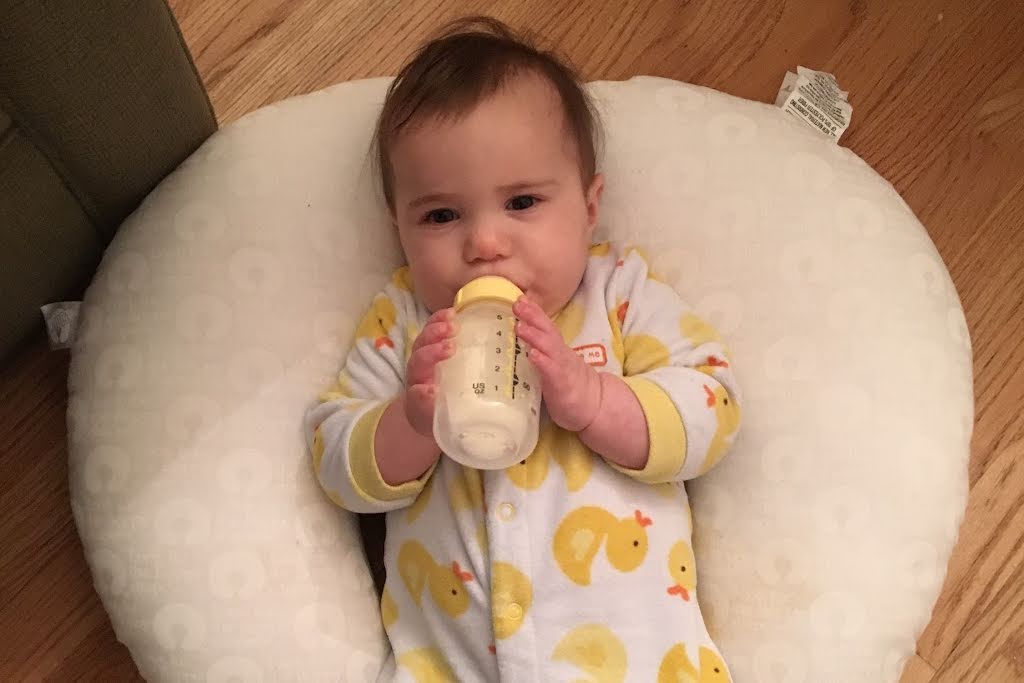
This post may contain affiliate links, which means if you click a link and purchase something, I may make a small commission at no additional cost to you. I only recommend products I love! More information here.
As we’ll discuss in the next section, there is a lot of variability in how much milk breastfed babies take. Some babies take 20 oz per day, others take 35 oz.
Because of this, there is no one size fits all answer as to how much your baby should eat in one bottle, or overall in a day.
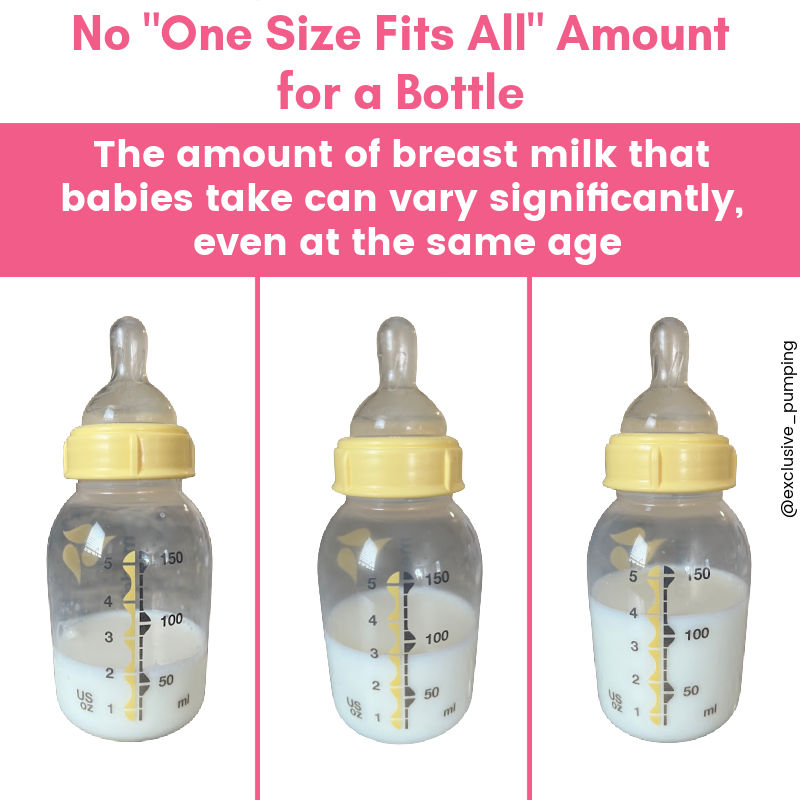
When you’re trying to figure out how much to feed your baby, the most important thing to look at is your baby.
For example, if baby is often leaving some milk in the bottle, you may want to reduce the amount you feed. On the other hand, if baby is frequently hungry again less than a few hours after a feeding, you may want to increase the amount of milk in the bottles. (Note that there is some nuance here – for example, I wouldn’t include cluster feeds in this.)
Obviously, in addition to this trial and error, you should talk to your pediatrician about any concerns you have about how your baby is growing, and if you should be worried about potential overfeeding.
But – where do you start with figuring out how much breast milk you should feed to baby? To give you an idea, I did a survey of how much milk exclusive pumpers bottle fed their babies.
What is the average milk intake per day for breastfed babies drinking from bottles?
The overall average intake for babies across the first year was 26.8 oz (792.5 ml); after one month of age, the minimum reported daily intake for was 16 oz (473 ml) and the maximum was 48 oz (1,420 ml). Below is a chart showing how the results were distributed:

Here we can see that most babies eat between 24 (710 ml) and 30 oz (887 ml).
How many ounces do breastfed babies eat at 2 months, 3 months, 4 months, etc.?
As one might expect, breast milk intake varied slightly with the baby’s age, with it averaging slightly lower in the first month of life and then increasing up to between 26 and 28 oz (770 and 828 ml) until about 10 months of age.
At 10 months, intake starts to drop; presumably, solids are making up a more substantial part of the baby’s diet. The average drops down to 25 oz (740ml) at 10 months and 19.5 oz (577 ml) at 11 months.
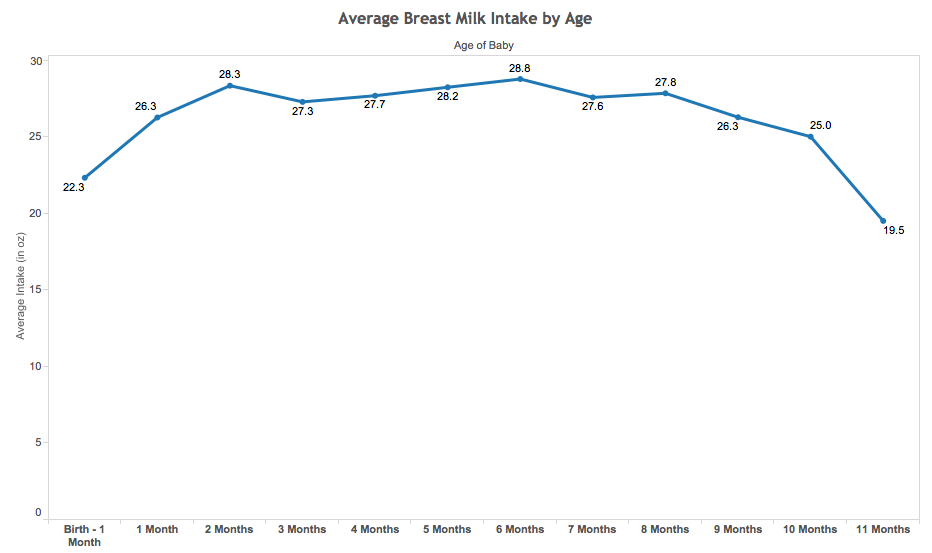
I also looked to see if breast milk intake varied by any other factors that I had asked about in the survey, such as the age of the mother, whether the baby was a first baby or a subsequent child, and race.
I didn’t find any statistically significant differences based on maternal or child characteristics, except for the age of the baby as described above.
How does average breast milk quantity consumed compare to formula feeding guidelines?
I was curious whether or not the results that I got in survey would be similar to formula feeding guidelines, so I looked up the American Academy of Pediatrics guidelines.
Reading them is a bit confusing, as the descriptions of appropriate intake use three ranges – the age of the baby (i.e., 1-3 months), the amount of formula (i.e., 2-3 oz), and the number of feedings (i.e., every 3-4 hours).
To simplify things, I broke the guidelines down into the below table:

Here we can see that the total daily recommended intake is fairly close to the averages reported above for babies by age. The recommendation is slightly lower in the beginning, but on par with actual totals for breastfed babies by six months.
Note: The typical feeding schedule for breastfed babies may be very different from that of formula-fed babies. It’s more common for breastfed babies to eat more often and less on schedule than formula-fed babies, likely because (as noted above) breast milk is metabolized more quickly than formula. This discussion is only about total intake.
How much breast milk should you give your baby per feeding?
This depends on baby’s age and also varies quite a bit by baby.
I didn’t include amounts per feeding in my survey, but I will share the amounts in my baby’s bottles at different ages (again, this is just my baby and yours might have different needs):
- First month (after the first week) – 2-3 ounces per feeding
- Second and third month – about 3 ounces per feeding
- Third and fourth month – 3-4 ounces per feeding
- Fifth month going forward – 4-5 ounces per feeding
Need help with exclusive pumping? Use EPUMP30 for 30% off
Is it true that babies shouldn’t take more than 4 oz of breast milk at a time?
I’m not really sure where this “rule” came from, but I’ve been asked about it frequently.
My opinion is that there aren’t ounce markers on breasts, so nursing moms have no idea if their babies are taking less than 4 oz, exactly 4 oz, or more than 4 oz. Therefore, there’s no evidence that limiting the intake of breastfed babies is necessary or beneficial.
The baby that I exclusively pumped for regularly took 8 oz before bed. After I’d been asked about this a few times, I was curious and I did an Instagram poll to see if I was alone in this.
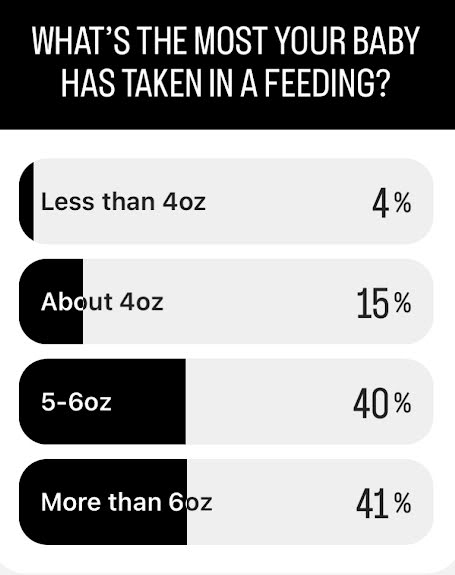
Again, talk to your pediatrician with any concerns that you have about feeding your baby, but I don’t think you need to take this “rule” at face value.
Will my milk supply increase ass baby gets older and starts to eat more?
Lots of women wonder whether their milk supply will gradually grow over the months as baby starts to eat more.
The answer is no – because as you can see from the data above, the amount of milk that babies take usually stays fairly consistent from the first month until it decreases because solids make up a bigger part of the baby’s diet. The amount they take per feeding might go up, but total intake in a day often remains consistent due to fewer feedings.
What do you think – what’s your experience with the amount of breast milk you feed to your baby? Let us know in the comments!
References
- Healthy Children. “Amount and Schedule of Formula Feedings.” https://www.healthychildren.org/English/ages-stages/baby/feeding-nutrition/Pages/Amount-and-Schedule-of-Formula-Feedings.aspx
